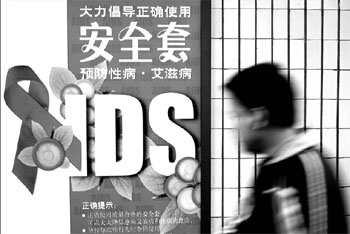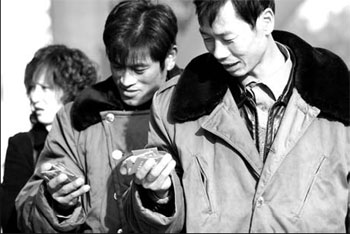The good fight
Xiao Chen (pseudonym), 23, admits that the place she works is "not extravagant". Besides struggling to survive, she has another mission: "We often have new 'sisters', young and naive; I have my own way to raise their awareness of HIV. I tell them that once you've contracted the virus, your life is over, regardless of how much you've earned. Most of the time, they listen to me, because I'm one of them."
Xiao Chen belongs to an NGO called The Dragonfly Group. Many members are like her, working at nightclubs in Southwest China's Sichuan Province, which has the sixth highest HIV infection rate in the country.
While government officials and social workers are trying to raise public awareness about this deadly disease, they've found the help of NGOs very useful.
A man walks past a condom advertisement billboard on display in Beijing. AFP |
Over the past few years, the local government spent a lot of time and energy to try to identify the sheer scale of the sex-worker industry but has found the task daunting, admits Ms Liu, a health official with the disease control department on the outskirts of Chengdu, capital of Sichuan.
Liu, who asks not to disclose her full name, recalls that in 2004, she and her colleagues drove around town to figure out how many sex workers work in nightclubs and walk the streets. Whenever they saw an entertainment venue, one of their male colleagues would enter, pretending to seek the services of a sex worker. If the owner said such a service was available, they would then go in to investigate.
However, as soon as they said they wanted to distribute condoms and promote the knowledge of HIV/AIDS prevention, "the owner would often deny involvement in sex services, then push us away".
Their work became easier when The Dragonfly Group was involved. There's great mobility among the women who work in the industry. In this sense, a sex worker is like a "dragonfly" - wherever she goes, she can take the preventive knowledge about HIV/AIDS with her and approach her new peers with it, Liu explains.
Figures from the provincial heath bureau reveal that there are now almost 8,000 people infected with HIV in Sichuan, with the first case reported back in 1992. Commentators believe the real figure is much higher - around 60,000, with the rising number of cases infected through sex, causing increasing alarm to the local health bureau.
While the NGO's role as a growing force in the national war against HIV/AIDS is becoming more and more evident, the bottleneck of related laws is also becoming more apparent as well.
The Sichuan provincial government is seeking to address the burgeoning problem. One recent measure was completion of the research report To Get NGOs Involved in National Lawmaking for HIV Control Work.
Based on the research, financially backed by a China-UK project called China AIDS Roadmap Tactical Support (CHARTS), legal experts believe that "NGOs play an irreplaceable role in China's arduous battle against HIV/AIDS, and their involvement is an inevitable trend".
"It's necessary to set up the NGO organization law and revamp the current regulations related to social organizations," said Liu Xiao, an official with the Sichuan provincial government's Legislative Affairs Office, which conducted the research in December last year.
Often referred to as the "21st century plague", the unprecedented spread of HIV/AIDS caught the world off-guard, primarily because of the lack of understanding and social stigma surrounding the virus, experts say.
"A large portion of high-risk people, such as sex workers and gay communities, are undercover," said Xu Baohua, deputy director of the Disease Prevention and Control Department at the Sichuan Health Bureau. "It is very difficult to reach our prospective goal, if we use the traditional method - mobilizing government institutes at all levels, like we confront any sudden crisis of public health, such as SARS - to fight HIV/AIDS, we cannot achieve the desired effects."
Xu said fighting the HIV/AIDS epidemic is a protracted war, during which the NGO is a force not to be ignored. They can go to the epicenters and initiate activities that government organizations cannot.
However, NGOs are still trapped in an awkward situation. According to the present Regulation on the Registration of Social Organizations that the State Council issued in 1998, in order to gain legal status, a social organization should first be examined and approved by a related governing department. Only then can an organizer be registered in the department of civil affairs and become lawful.
NGOs are purely non-profit organizations, and as such, they have relaxed requirements for qualification. Some NGOs have to register as enterprises. Wang Xiaodong for instance, has his NGO Chengdu Gay Community Care Organization registered as a health consultancy.
"That means some NGOs have no legal status, while some are working as semi-official government organizations, which partially exercise governmental functions and receive funds from the government purse," Liu Xiao said.
These institutional restrictions have hindered the development of NGOs. So far, there are no more than 10 NGOs registered on HIV/AIDS prevention in Sichuan.
Figures released by the Public Health School at the West China University of Medical Sciences suggest that there are about 71,000 homosexual men in Chengdu.
Wang Xiaodong, however, said "the real number is probably nearer to 100,000, with about 8,000 to 18,000 in active relationships".
Passengers get free handout condoms at the Zhengzhou Railway Station of Henan Province on the World AIDS Day on December 1, 2006. |
Most gay men are "virtually invisible, thus presenting a threat to HIV/AIDS prevention at large," said Wang. "What we've been doing as an NGO is trying to identify people that hide their sexual orientation and empower them with knowledge about how to fight the plague."
Entrusted by the Health Ministry's National Center for AIDS/STD Control and Prevention of the CDC earlier this year, Wang's Gay Community Care Organization based in Chengdu drafted an AIDS Prevention Program for the Chinese Gay Community.
Wu Zunyou, director of the national center, said that, "because homosexuals are a high-risk group, letting their own organizations take part in the drafting of a government program would make the country's HIV/AIDS prevention work much more focused and effective."
As Wang pointed out, although their activities are purely non-profit, many of the unofficial NGOs pay the price for being registered as companies. "We still have to pay sales tax of about 10,000 yuan ($1,300) a year," he said.
Consequently, it is extremely difficult for an NGO with a business registration to get sufficient financial support from social organizations - especially when it comes to international ones. Wang's consultancy has benefited from donations totalling only 3,000 yuan ($375) since it was set up in 2004.
According to present Ministry of Finance and State Administration of Taxation regulations, in order to benefit from tax reductions or remittance on donations, domestic enterprises can only give money to 12 officially acknowledged charity organizations, such as the Red Cross Society of China and the China Charity Federation.
Xu Baohua, of the provincial health bureau, noticed the funding limitations of the current laws and regulations are affecting not only NGOs, but also the initiatives of donors, hindering the development of important HIV/AIDS preventive work.
China has more than 230,000 NGOs. Of these, around 22,000 are based in Sichuan, but only 50 are actively involved in HIV/AIDS prevention work.
Under the current situation, Liu Xiao said, it is necessary to improve the legal environment for NGOs engaged in HIV/AIDS battles.
Liu Xiao said national lawmakers should set up new NGO laws to clarify their legal statues, duties and legitimate rights. In the meantime, the government should improve feedback mechanisms for NGOs to make suggestions on HIV/AIDS policies, along with creating a simpler administrative process for registration.
Liu said that the government could set up a special fund and employ tax remittances for enterprises that help fund social initiatives, such as HIV/AIDS prevention work.
Based on his suggestions, the Sichuan provincial government is currently drafting new regulations to deal with the issue. They are expected to issue their report early next year.
(China Daily 06/07/2007 page20)
















